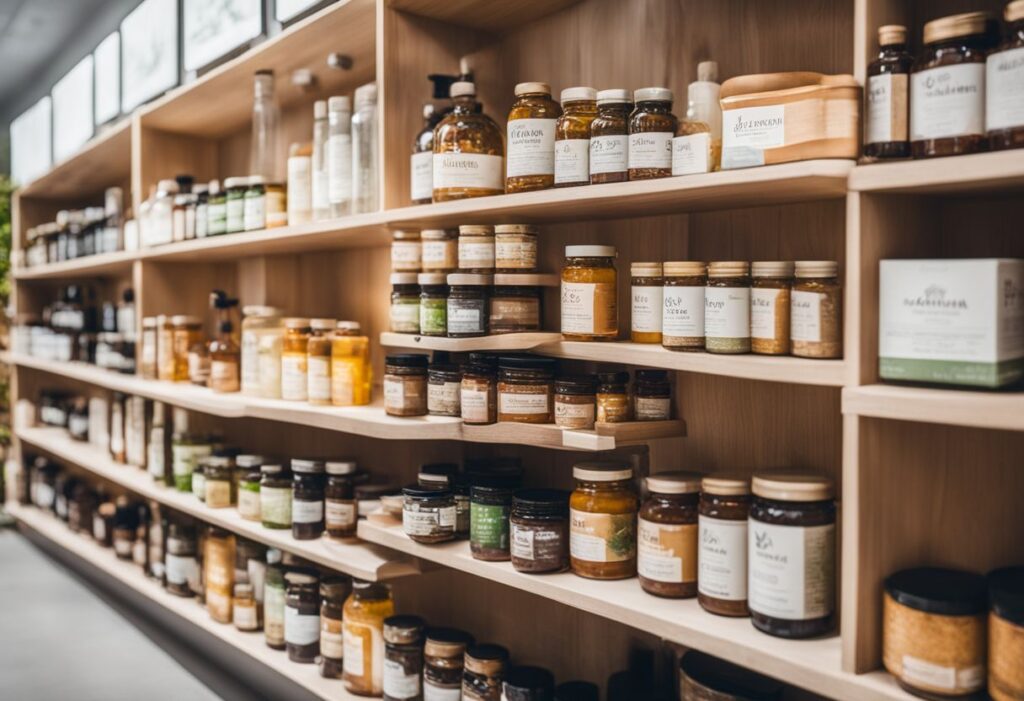Clients are able to receive a free 30-minute consultation with a company representative to get a better understanding of what they need.
Let Us Do the hard work for you

Amidst the growing popularity of natural remedies, it’s crucial to understand that not all products branded as ‘natural’ guarantee safety or effectiveness. As Canadians turn increasingly towards Natural Health Products (NHPs), the onus falls on regulators to ensure public health isn’t compromised.
With extensive experience in navigating Canada’s regulatory environment, this article distils complex compliance principles into digestible wisdom for everyday consumers.
Canada stands at the forefront of safeguarding its citizens through stringent NHP regulations—mandated by Health Canada—to confirm that these products are indeed suitable for consumption.
Unravelling this intricate framework will unlock a comprehensive vista about what goes behind each certified product lying on your shelf, ensuring you make informed choices backed by government oversight.
Let’s explore how these safeguards work for you.
Natural health products (NHPs) in Canada are subject to regulation to ensure they are safe, effective, and of high quality for consumer use. These products range from vitamins and minerals to herbal remedies and homeopathic medicines.
As such, the regulatory framework serves a critical role in protecting public health by establishing guidelines for good manufacturing practices, accurate labelling, and substantiated health claims.
Additionally, this oversight helps prevent misleading statements or any potential harm that could arise from improper dosage or contamination of natural health products.
NHPs stand for natural health products. These are items that come from nature to help you stay healthy or get better when you’re sick. They often include vitamins, minerals, herbal remedies, homeopathic medicines, probiotics, and other types of plants and foods used as medicines.
In Canada, people need to know that NHPs are not the same as prescription drugs. They have their own rules to follow under the Natural Health Products Regulations. This means that before you see these products on shelves, they must meet strict guidelines set by Health Canada to make sure they are safe and do what they say they will do.
You can find NHPs in many places like health food stores or pharmacies without needing a note from your doctor. It’s important that these products tell you clearly what is inside them and how much to take so you can use them safely.
Packaging includes useful information such as the expiry date, dose instructions and if there is anything like gluten or nuts which some people might be allergic to.
Natural health products (NHPs) are seen as less risky than other types of medicines. This is because they usually come from things found in nature, like plants and minerals. Since they are not as strong as prescription drugs, the rules for them don’t need to be as tough.
Health Canada knows that NHPs have a lower risk. Because of this, they made sure the rules fit the level of risk. For example, about 13% of these safer NHPs won’t have to follow new rules about listing all their ingredients on a Product Facts table.
This approach helps make sure that you can use NHPs safely without too many hard rules. It’s good for both people who make these products and those who buy them. Everyone gets what they need with fewer worries about safety risks or breaking laws.
Even though natural health products (NHPs) are lower risk, they come in many forms. Each type has its own use and benefits. Here’s a look at the different kinds of NHPs:

In Canada, the oversight of natural health products (NHPs) falls under Health Canada’s Natural and Non-prescription Health Products Directorate, which ensures that Canadians have access to NHPs that are safe, effective, and of high quality while respecting freedom of choice and philosophical and cultural diversity.
This regulatory body mandates that all NHPs undergo a rigorous review process before they can be legally sold in the country. Each product must obtain a product licence by providing detailed information on its ingredients, source, potency, dosage form and recommended use.
In addition to individual product approval, companies must comply with Good Manufacturing Practices (GMPs), ensuring their facilities meet stringent standards for production processes and conditions.
By enforcing these regulations, the Government of Canada aims to protect public health whilst supporting individuals’ rights to use such products as part of their healthcare regimen.
Health Canada has an important job. They check natural health products to keep Canadians safe. This means they make sure the things you use to stay healthy, like vitamins or herbal remedies, are okay to take.
Health Canada does this by using rules called the NHPR.
They have new plans to change these rules so they can do an even better job. The goal is to make sure everyone feels good about what natural health products they use. Health Canada looks at everything very carefully before saying it’s safe.
This includes checking that no harmful stuff, like sulphites or other allergens, is in them.
Their work helps everyone know that what they buy will help them and not harm them. If something goes wrong with a product, such as if it causes bad reactions or doesn’t do what it says, Health Canada can act quickly and may tell people about product recalls.
So when you pick up a bottle of natural health pills or oils, remember – Health Canada was there making sure it went through all the checks needed for your safety!
The Government of Canada makes sure that natural health products (NHPs) are safe for you to use. They work with Health Canada, who looks after the rules about these products. There are special rules just for NHPs because they are different from medicines that doctors prescribe.
These rules help keep you safe when using vitamins, minerals, and herbs.
Health Canada checks on NHPs to see if they work well and if they don’t have anything harmful in them. This means looking at scientific proof and making sure companies follow good practices in making their products.
When the government gets involved, it helps build trust between people making NHPs and those buying them.
Next up is a look at some new changes coming to how natural health products are managed in Canada.
Under the new regulations for Natural Health Products (NHPs), you may notice changes that affect both cost and product availability. Critics in the industry have voiced their concerns, highlighting how these adjustments could lead to a decrease in consumer choice and an increase in prices due to higher operational expenses.
These modifications are part of Canada’s continuous efforts to ensure safety and efficacy within the NHP market; however, they come with implications for manufacturers and retailers who must now navigate stricter compliance measures.
New rules in Canada for natural health products mean you may have to pay more. Health Canada wants to charge yearly fees for things like checking products and giving out licences. This money will help them keep an eye on natural health products.
You’ll see these charges when you buy these items or renew any licences. The costs go towards making sure everything is safe and follows the rules.
Making a product takes work, and added fees can make it costlier for companies. These expenses often get passed down to you, the buyer. So, as companies spend more on getting their licence and keeping it each year, the price of natural health products might go up too.
Higher costs often lead to fewer options on the shelves. This is what’s happening with natural health products in Canada. The new rules aim to make these products safer for you by checking them more closely.
But this means that making and selling them could get more expensive. When things cost more to make, sometimes companies decide to offer fewer products.
You might find less variety when you look for your favorite herbal teas or vitamins. Some items that were easy to find before might not be there anymore. Companies might stop making products that are not popular or too costly to check.
This change can be tough if you rely on certain natural health items. You may need to switch brands or look harder for what you need. Stores and online shops might have a smaller selection of goods for you to choose from.
Some people who work with natural health products are not happy with Canada’s new rules. They say that these changes will make things more expensive and there won’t be as many products for you to choose from.
These experts in cities like Edmonton are speaking up because they care about having a variety of choices and keeping prices fair.
The people who make and sell natural health products have a lot to say about these new rules. They worry that Health Canada is asking them to do too much, which could hurt their businesses.
The extra steps mean spending more money, which might lead some smaller companies to stop making certain items or even close down.
It’s important for users like you to understand what these regulations could mean for the future of your favourite supplements or herbal medicines. Without enough choices, it can be harder for you to find the right products for your health needs at a good price.
Some industry pros think this isn’t fair and want the government to think again on how they control natural health products.
5. Bill C-47 and Increased Enforcement on NHPs: With the introduction of Bill C-47, you’ll find that enforcement powers regarding Natural Health Products (NHPs) have widened, affecting both manufacturers and retailers in terms of compliance obligations.
If you’re part of this industry or a user intrigued by these changes, delve further to grasp the full impact on your business or consumption practices.
Health Canada now has more power to make sure NHPs are safe. This comes from changes in the Food and Drugs Act because of Bill C-47. With these new powers, Health Canada can do more to deal with risks that might come from using NHPs.
For example, they can order products off shelves if they find problems.
They also have the strength to ask for more information about a product’s safety and how it works. If companies don’t follow the rules, Health Canada can act quickly to protect people’s health.
This could mean telling everyone about risks or making companies take action to fix issues with their products.
Manufacturers and retailers of natural health products (NHPs) in Canada are feeling the pressure. New rules mean they spend more money to meet standards and keep their licenses. They have to do tests, fill out lots of forms, and make sure everything they sell is safe and works like it should.
These changes can lead to fewer choices on shelves for you. Companies might stop making some NHPs because it costs too much or takes too long to follow all the new steps. This could be hard for you if you rely on certain herbal medications or supplements.
To stay in business, manufacturers and retailers need to know what they have to do now. They must work closely with Health Canada, learn about clinical trials, get the right approvals, and always make sure their products are top quality.
Up next: let’s talk about compliance requirements for these companies
You need to know the rules if you sell or make natural health products in Canada. Health Canada sets these rules to make sure everything is safe and works well.
Remember how Health Canada looks after natural health products? They make sure these products are safe for you to use. New rules in 2023 will help make them even better. If you want to stay healthy using natural remedies, it’s smart to know these rules.
Keep learning and take care—you’ve got this!

At MFLRC, we’re dedicated to guiding you through the complex landscape of licensing, regulatory compliance, and quality assurance with expertise and precision. As a dynamic team of consultants with specialized knowledge across Cannabis, Pharmaceutical, Food, Cosmetics, Tobacco, and Natural Health industries, we understand the unique challenges and opportunities within these sectors.
Our mission is to empower your business through tailored consultation services that not only ensure you meet industry standards but also elevate your operational excellence. Whether you’re navigating the intricacies of GMP, EU-GMP, or GPP compliance, our experts are here to provide comprehensive support every step of the way.
Let us take the burden off your shoulders so you can focus on what’s important – growing your business.
Contact us Now!
Mussarat Fatima, President, and owner of MF Cannabis License and Regulatory Consultants has more than twenty years of experience in Quality Assurance, Quality Control, and Regulatory Affairs within the pharmaceutical, Food and Cannabis industries. She has a Master’s Degree in Food Sciences and Biochemistry; in addition to this, she also has a diploma in pharmaceutical Quality Assurance, Regulatory Affairs, and Quality Control. Also, she has completed several certifications specifically in Cannabis Quality Assurance, Regulatory Affairs, and Facility management from recognized institutes in Canada.

Written By: Mussarat Fatima
President at MF License & Regulatory Consultants
Website: https://mflrc.com/
Contact: info@mflrc.com